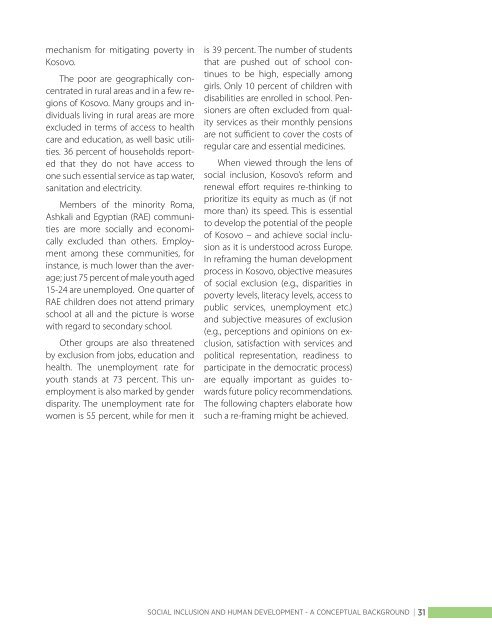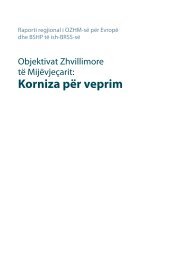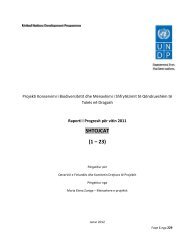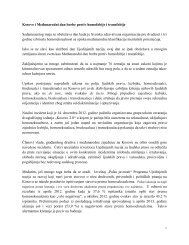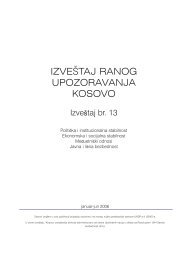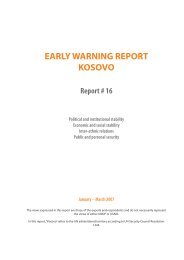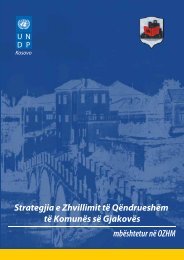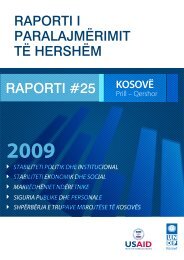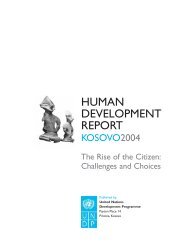Kosovo Human Development Report 2010 - UNDP Kosovo - United ...
Kosovo Human Development Report 2010 - UNDP Kosovo - United ...
Kosovo Human Development Report 2010 - UNDP Kosovo - United ...
Create successful ePaper yourself
Turn your PDF publications into a flip-book with our unique Google optimized e-Paper software.
mechanism for mitigating poverty in<br />
<strong>Kosovo</strong>.<br />
The poor are geographically concentrated<br />
in rural areas and in a few regions<br />
of <strong>Kosovo</strong>. Many groups and individuals<br />
living in rural areas are more<br />
excluded in terms of access to health<br />
care and education, as well basic utilities.<br />
36 percent of households reported<br />
that they do not have access to<br />
one such essential service as tap water,<br />
sanitation and electricity.<br />
Members of the minority Roma,<br />
Ashkali and Egyptian (RAE) communities<br />
are more socially and economically<br />
excluded than others. Employment<br />
among these communities, for<br />
instance, is much lower than the average;<br />
just 75 percent of male youth aged<br />
15-24 are unemployed. One quarter of<br />
RAE children does not attend primary<br />
school at all and the picture is worse<br />
with regard to secondary school.<br />
Other groups are also threatened<br />
by exclusion from jobs, education and<br />
health. The unemployment rate for<br />
youth stands at 73 percent. This unemployment<br />
is also marked by gender<br />
disparity. The unemployment rate for<br />
women is 55 percent, while for men it<br />
is 39 percent. The number of students<br />
that are pushed out of school continues<br />
to be high, especially among<br />
girls. Only 10 percent of children with<br />
disabilities are enrolled in school. Pensioners<br />
are often excluded from quality<br />
services as their monthly pensions<br />
are not sufficient to cover the costs of<br />
regular care and essential medicines.<br />
When viewed through the lens of<br />
social inclusion, <strong>Kosovo</strong>’s reform and<br />
renewal effort requires re-thinking to<br />
prioritize its equity as much as (if not<br />
more than) its speed. This is essential<br />
to develop the potential of the people<br />
of <strong>Kosovo</strong> – and achieve social inclusion<br />
as it is understood across Europe.<br />
In reframing the human development<br />
process in <strong>Kosovo</strong>, objective measures<br />
of social exclusion (e.g., disparities in<br />
poverty levels, literacy levels, access to<br />
public services, unemployment etc.)<br />
and subjective measures of exclusion<br />
(e.g., perceptions and opinions on exclusion,<br />
satisfaction with services and<br />
political representation, readiness to<br />
participate in the democratic process)<br />
are equally important as guides towards<br />
future policy recommendations.<br />
The following chapters elaborate how<br />
such a re-framing might be achieved.<br />
SOCIAL INCLUSION AND HUMAN DEVELOPMENT - A CONCEPTUAL BACKGROUND<br />
| 31


